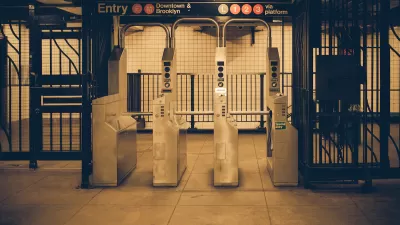Communications Based Train Control (CBCT) will allow New York City's subways to run more efficiently than ever. But like with all service improvements, implementation will take some time and patience, write Josef Szende and Charles Komanoff.
"Whereas the century-old system now in use relies on block signals with colored lights alongside the track to tell operators if they're too close to the train ahead, CBTC uses radio signals to locate all of the trains on the line. With this information, on-board computers can calculate the distance between trains precisely and in real time, letting operators run trains closer together without compromising safety.
With more trains per hour, wait times will diminish and trains should be less crowded - allowing for increased ridership as the experience of riding the subway becomes more convenient and pleasant. Adding just one train per hour adds space to move another 2,640 people. That translates to fewer times waiting while a packed train goes by, and fewer elbows in your ear when you board."
Thanks to Georgia Bullen
FULL STORY: New Tech Promises Less Subway Crowding, If Albany Doesn’t Beggar the MTA

Planetizen Federal Action Tracker
A weekly monitor of how Trump’s orders and actions are impacting planners and planning in America.

Maui's Vacation Rental Debate Turns Ugly
Verbal attacks, misinformation campaigns and fistfights plague a high-stakes debate to convert thousands of vacation rentals into long-term housing.

Restaurant Patios Were a Pandemic Win — Why Were They so Hard to Keep?
Social distancing requirements and changes in travel patterns prompted cities to pilot new uses for street and sidewalk space. Then it got complicated.

In California Battle of Housing vs. Environment, Housing Just Won
A new state law significantly limits the power of CEQA, an environmental review law that served as a powerful tool for blocking new development.

Boulder Eliminates Parking Minimums Citywide
Officials estimate the cost of building a single underground parking space at up to $100,000.

Orange County, Florida Adopts Largest US “Sprawl Repair” Code
The ‘Orange Code’ seeks to rectify decades of sprawl-inducing, car-oriented development.
Urban Design for Planners 1: Software Tools
This six-course series explores essential urban design concepts using open source software and equips planners with the tools they need to participate fully in the urban design process.
Planning for Universal Design
Learn the tools for implementing Universal Design in planning regulations.
Heyer Gruel & Associates PA
JM Goldson LLC
Custer County Colorado
City of Camden Redevelopment Agency
City of Astoria
Transportation Research & Education Center (TREC) at Portland State University
Jefferson Parish Government
Camden Redevelopment Agency
City of Claremont




























